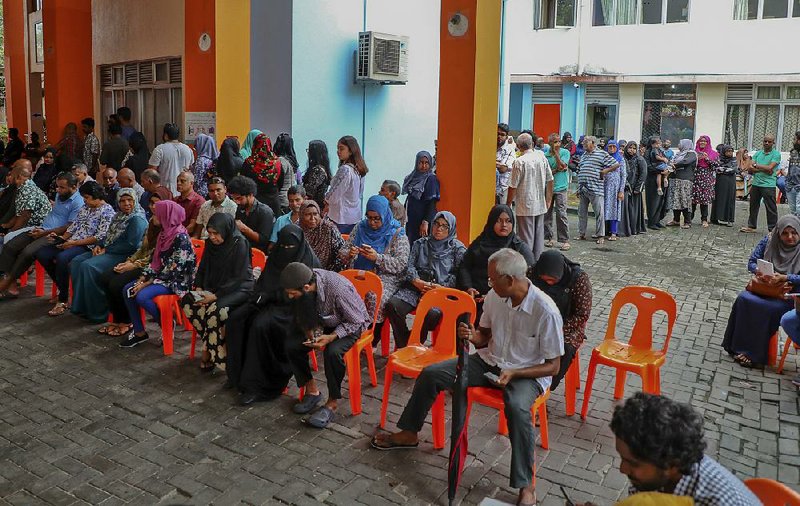MALE, Maldives -- Opposition presidential candidate Ibrahim Mohamed Solih, a longtime but little-known lawmaker, declared victory at his party's campaign headquarters in the capital city Male in a contentious election widely seen as a referendum on the island nation's young democracy.
Supporters draped in the Maldives' flag took to the streets, hugging one another, cheering and honking horns to celebrate Solih's unexpected win.
Solih had 58.3 percent of the vote, with nearly 92 percent of ballots counted early today, according to independent newspaper website mihaaru.com. Election watchdog Transparency Maldives tweeted that Solih had won "by a decisive margin."
President Yameen Abdul Gayoom's campaign had not conceded the race, and no one from the campaign could be immediately reached for comment.
A spokesman for Maldives' Election Commission said official results wouldn't be announced for a week, the period reserved for parties to file election petitions in court challenging the result.
The opposition had feared the election would be rigged in favor of strongman Gayoom, whose first term was marked by a crackdown on political rivals, courts and the media.
In a victory speech, Solih called the election results "a moment of happiness, hope and history," adding that he did not think the election process had been transparent.
A police raid on Solih's main campaign office the night before the election was seen by the opposition as a worrying sign that Gayoom would "muzzle his way" to re-election, according to Hamid Abdul Gafoor, an opposition spokesman and former Maldives lawmaker now based in Colombo, Sri Lanka.
Famed for its sandy white beaches and luxury resorts, the Maldives under Gayoom has seen economic growth and longer life expectancy, according to the World Bank. But Gayoom's critics, including Solih, say he has systematically rolled back democratic freedoms.
Few foreign media organizations were allowed in to cover the election, and there had been warnings that the Maldives was slipping back to autocratic rule, just a decade after achieving democracy.
Gayoom used his first term to consolidate power, jailing opponents, including his half brother, a former president, and two Supreme Court Justices.
In February, Gayoom declared a state of emergency, suspended the constitution and ordered troops to storm the Supreme Court and arrest judges and other rivals to stave off impeachment.
The European Union had said that it was not sending election observers because the Maldives had failed to meet the basic conditions for monitoring. The U.S. had threatened to sanction Maldivian officials if the elections were not free and fair.
Opposition supporters in the Maldives and in neighboring Sri Lanka, where former President Mohamed Nasheed lives in exile, decried Saturday's raid as a naked attempt to rig the vote in favor of Gayoom.
Despite the turmoil, voters flocked to the polls on Sunday, standing in long lines in rain and high temperatures to cast ballots.
More than 260,000 of the Maldives' 400,000 people were eligible to vote at about 400 polling stations across the approximately 1,200 islands that comprise the Indian Ocean archipelago. Voters also stood in long lines in Malaysia, the U.K., India and Sri Lanka, where the opposition had encouraged overseas Maldivians to participate.
A Section on 09/24/2018

